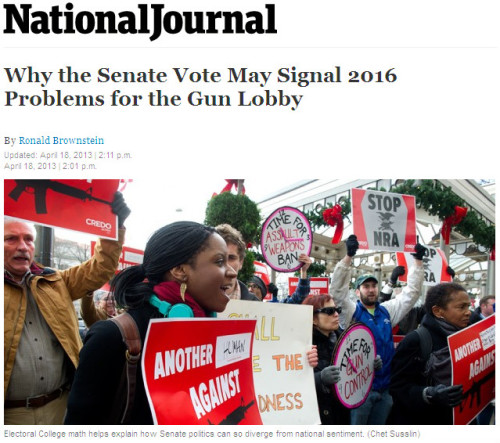National Journal: The outcome of Wednesday’s dramatic Senate vote on expanding background checks simultaneously demonstrated the difficult geography confronting gun control advocates in the Senate and the potentially daunting math facing gun rights proponents in the Electoral College.In other words, the demographics of the Senate are very, very different from the demographics of the nation. What Republicans can win in the Senate is not necessarily an indication of the mood of the nation. In fact, the popular opinion landscape is even worse for Republicans than you might assume, since even with the outsized power of smaller states, the soft-on-crime side lost the vote — background checks would’ve passed with a 54 vote majority if it weren’t for the filibuster.
On the one hand, the defeat showed how difficult it is for gun control advocates to reach the 60 vote threshold required to break a filibuster in an institution whose two-Senator per state apportionment magnifies the impact of small, heavily rural states where guns are interwoven into the culture.
On the other, the vote suggested that, after years in which gun control has been sublimated as a political issue, support for expanding background checks and possibly further steps has again become a political norm in almost all of the blue-leaning states that underpin the recent Democratic advantage in the race for the White House.
Newsflash: you don’t get to filibuster the 2016 elections. They’re walking into a clear loser here.
This morning, I wrote that Republicans would “be wise to ask themselves how many of these sorts of ‘victories’ their party can actually survive.” The electoral math is one more reason why they should slow down, take a deep breath, and consider whether this kind of “winning” is actually worth all the self-inflicted damage.






